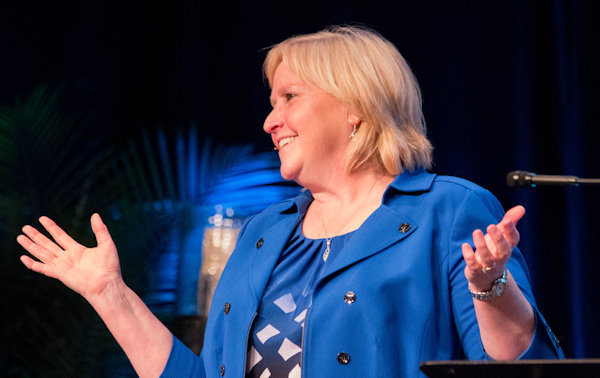Videos of Rev. Susan Beaumont’s two teaching sessions are now available to view.
Teaching Session #1, Thursday, June 1: Leading in a Liminal Season
The Rev. Susan Beaumont, a native of Troy, Michigan returned to her home state as the lead teacher for the 2017 Michigan Annual Conference. With presentation time on Thursday night and Friday afternoon, Susan’s topic was, “Leading in a Liminal Season.” A consultant and spiritual director with years of experience with the Alban Institute, Beaumont first defined, liminality: “a transitory space, betwixt and between.” Today the denomination, the country, the conference, and personal lives exist in between something that is ending and something that has not yet begun.
Quoting theologian Richard Rohr, she explained, “Liminality is a space we hate to occupy but it’s where the biblical God is continually taking us.” Addressing the group of leaders in the room as 21st century incarnations of Adam & Eve, Abraham and Sarah, Beaumont spent the bulk of the hour outlining what type of leadership is needed for such a time. This different kind of leadership is necessary in order for “god to work with us to do remarkable things.”
Basically what’s needed is to “stand still and let the Holy Spirit work through us.” She outlined opportunities: 1) Communitas; 2) rediscovery of core identity; 3) shedding what no longer fits; and 4) a deepened capacity for discernment. There are also threats: 1) anxiety; 2) denial; 3) shifting power dynamics; and 4) fear that nothing will remain.
“Leading with presence” requires a movement away from knowing to a stance of unknowing; a movement from advocating to deep intense attending; and moving away from striving to a stance of surrender. Leading with presence allows organizations to leave behind judgment, cynicism, and fear and to experience “a fresh breath of creativity that emerges with letting go.”
Click here to view Session 1 on Vimeo.
Teaching Session #2, Friday, June 2: Tending the Soul of the Institution
Susan Beaumont returned to the Governors’ Hall Friday afternoon to conclude her teaching on the topic, “Tending the soul during liminal times.” In her first presentation she spoke of the importance of “standing still and letting the Holy Spirit work through us.” However, today she added, “If you only stand and wonder, you don’t last very long.” She went on to offer four ways to act as “agents of the divine spark.”
She spoke of “the angel” of the church as the unique spirit that inhabits a congregation or conference in the way spoken of in the Book of Revelation. It is the “truest self” of the institution. Beaumont suggested four practices that keep us from “crashing through the woods, scaring the soul away.”
First, Deepening of Discernment: “Discernment assumes those with an open spirit can intuit the will of God. It happens best in community … discernment is hard work, requiring richer prayer.”
Second, Shaping Memory: “How is the conference talking about itself as things are shifting? Unearth these stories then bring them back into organizational life and ask, ‘Whose truth is this?
Third, Clarifying Vocation: “Much is unsettled in a liminal season. It is important to articulate our God-given identity that will provide stability during disturbance. Missional Identity + Core Values + Strategic Priorities clarify an organization’s unique calling and create vibrancy.”
Fourth, Engaging Emergence: “This process starts when something stops working (that makes us uncomfortable) and continues to disruption … When a system recognizes disruption and yields to it, that’s when innovation starts.”
Susan Beaumont concluded her teaching with a poem, “Patient Trust,” by Teilhard de Chardin, ending: “Give our Lord the benefit of believing that his hand is leading you, and accept the anxiety of feeling yourself in suspense and incomplete.”
Last Updated on June 7, 2017

